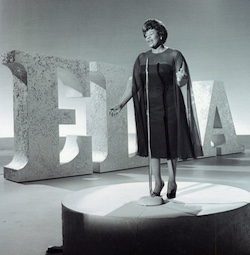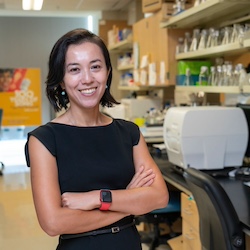The same year that “First Lady of Song” Ella Fitzgerald passed, her foundation began supporting City of Hope’s diabetes research. And it has continued those contributions ever since.

By the 100th anniversary of Fitzgerald’s birth, in 2017, Zhen Bouman Chen, B.Med., Ph.D., had joined City of Hope® and was receiving the Ella Fitzgerald Charitable Foundation’s support as a junior researcher with promise. Chen continues to amplify that support today.
“I am so grateful to the Ella Fitzgerald Charitable Foundation for their support of my diabetes research at City of Hope. Thanks to them, we are moving ever closer to optimal treatments for this challenging and complex disease,” Chen says.
Fitzgerald, known worldwide for her swinging jazz performances, had quintuple coronary bypass surgery in 1986 and was found also to have diabetes. In 1993, physicians amputated both of her legs below the knees because of diabetes complications. Fitzgerald died in 1996 at age 79.
There’s another woman Chen has in mind as she researches better therapies for diabetes patients: her mother.
“She has been diabetic for over 20 years. I take her to see a podiatrist annually. Fortunately, she doesn’t have peripheral artery disease (PAD),” Chen says. “But when I talk to her podiatrist, he says, ‘You have no idea — over 90% of my patients coming in for an amputation are diabetic.’”
The Fitzgerald Foundation supports City of Hope researchers with five-year grants. The foundation recently endorsed Chen’s progress with another five years of support.
Chen’s lab explores the molecular mechanisms which contribute to PAD, which is characterized by the occlusion of blood vessels, typically in the limbs. “Diabetic foot” is one of the most well-known expressions of PAD, and its gangrene necrosis can turn a foot black. Chen said there are still few therapies beyond surgery.
“Even after surgery, the diabetic conditions in most patients are not well controlled, and the peripheral arterial function is still poor. This can lead to further upstream leg damage. Among patients with diabetes who have one leg amputation, about half of them will die in five years, and the other half will live in fear of losing their other leg. It's very sad and very devastating,” she says.

Philanthropic support is vital to seed research into the newest ideas and help scientists prove their concepts. The results from early-stage research can then garner larger grants from government sources. This happened with Chen’s research. In early February, she was notified by the National Heart, Lung, and Blood Institute that she will receive an Emerging Investigator Award, a grant lasting up to seven years that will bolster her entire research program.
“The Fitzgerald Foundation has supported research that really addresses why people with diabetes are predisposed to all these severe complications, much more so than people without diabetes,” Chen says. “This new grant is for people that have done something very innovative and transformative in the field of cardiovascular research. This award will also address diabetes associated complications.”
Chen hopes that investigations into therapies that use nanomedicine or extracellular vesicles will reach clinical human trials to help patients with diabetes in the next decade.
A plaque in the Rose Garden at City of Hope’s main campus in Duarte, California, honors Fitzgerald. Along with her music, the work her foundation is supporting to change outcomes for people with diabetes is part of Fitzgerald’s lasting legacy.
Richard Rosman, president of the Ella Fitzgerald Charitable Foundation, says, "Ella would be proud to see all the research and the young researchers that her foundation has supported at City of Hope over many decades. She was a cheerful and optimistic person, and with each passing year, we have more and more hope that these young scientists will deliver innovative new therapies for people with diabetes."